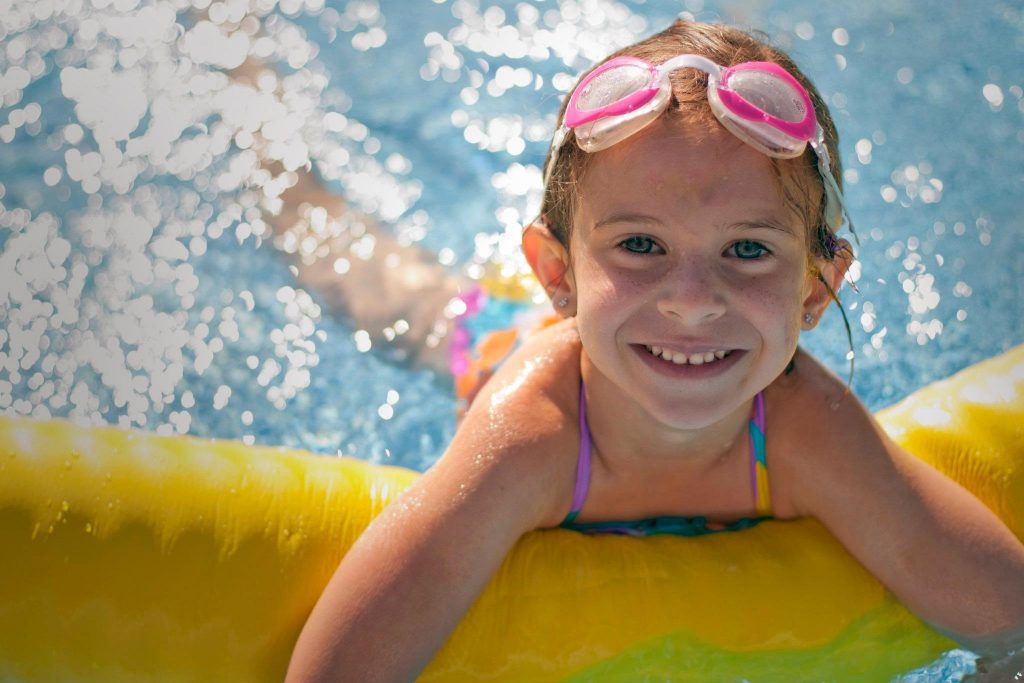
By Oyin Adedoyin
Jill Black grew up very familiar with water. Her mom was a lifeguard when she was a teenager and while attending college.
Black, who oversees swim and family programs at the Y in Central Maryland, recalls her mom enrolling her in swimming lessons as soon as possible.
“As soon as I was born pretty much, she took me to the Y to do swim lessons and just kept me in them all the way through my youth,” Black says.
Black followed in her mother’s footsteps and became a lifeguard when she was 18 years old. She quickly learned that swimming isn’t like riding a bike, and it’s important to continue with lessons even if you consider yourself a strong swimmer. This idea is one of the common misconceptions about water and summer safety that she recommends to parents to help them separate fact from fiction.
Last summer, recreational parks, pools and beaches across the country shut down to curb the spread of COVID-19. In light of more adults—and children ages 12 and older—getting vaccinated and traveling to beaches and pools this summer, we talked to health experts about some of the biggest misconceptions surrounding summertime activities and keeping kids safe.
Water safety
Myth: The little floaties that kids put on their arms are safe to use.
Reality: Black recommends getting a flotation device that meets the U.S. Coast Guard requirements.
“They have them for infants, babies, children, and toddlers,” she says. “And if it has the Coast Guard-approved stamp on the inside of the vest, then that’s the one you want to get.”
These devices will help keep children’s heads above the water compared to the little arm floaties that, even when used, can encourage their heads to dip below the water. Black also recommends signing up your kids for swim lessons at facilities such as the Y in Central Maryland before heading out into the water this summer, even if you think your children already know how to swim. Due to the COVID-19 pandemic, a significant amount of time may have passed since children have tested their swimming skills in the water, and Black says it’s best to be prepared ahead of time.
“They might have thought they could swim last year and then they get in and they haven’t been for a year or even over a year and their swimming skills aren’t as good,” she says. She also recommends always swimming with a buddy, such as an older sibling or adult.
Myth: You can easily tell when children are drowning because they’ll be kicking and screaming.
Reality: Most drowning incidents are silent.
It’s a common misconception that kids will draw attention to themselves in the water. “Over 90% of drownings are silent,” she says. “You don’t hear it happen.”
She also advises that keeping a fence around your residential pool with a gate that locks may keep kids from accessing pools unsupervised.
Sun exposure
Myth: Kids can’t get sunburn on cloudy days.
Reality: Clouds don’t affect how much UV exposure someone receives. “It’s still important to avoid sun exposure,” says Adam Spanier, associate professor and division head of general pediatrics and developmental and behavioral pediatrics at the University of Maryland School of Medicine, “particularly for babies younger than 6 months who cannot use sunscreen.”
The American Academy of Dermatology says that everyone should use sunscreen with an SPF of 30 or higher and one that is waterproof. Spanier recommends applying sunscreen at least 30 minutes before going outside. He adds that it’s important to reapply every two hours or after swimming or sweating. While sunscreens can go as high as SPF 100+, Spanier says it doesn’t help to go far above SPF 30.
Dehydration
Myth: Any drink can rehydrate your kid on a hot day.
Reality: Drinks with high amounts of sugar, such as fruit juices and lemonade, can increase dehydration.
“Water is always your best choice for rehydrating,” Spanier says. He adds that kids should be drinking water all the time, not just when they’re thirsty. Children should be encouraged to drink while outside in the heat because activities such as exercise and physical activity increase water loss. In cases of severe dehydration, Spanier says drinks with electrolytes can be helpful, however, it is important to avoid the high-calorie drinks with more sugar.
This story originally appeared in the June 2021 issue of Baltimore’s Child, a sister publication of Frederick’s Child.




